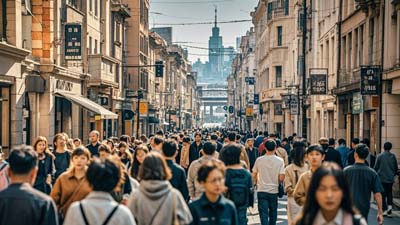
When you think about China, you may imagine dumplings, The Great Wall, towering skyscrapers, and almost certainly the enormous crowds that can be found here! The Chinese love to get out and explore their public places and tourist attractions. Often, these places quickly become overcrowded. When Chinese citizens come together to create a scene of “sea of people,” you can describe it with the phrase “人山人海 (rénshānrénhǎi).” You’ll see this crowd all year long, but one week in particular is well-known: the October 1 National Day and the “Golden Week” for Chinese tourism.
During the first week in October, the Chinese have a week off to reunite with families and travel. This “Golden Week” has become the top week for tourism in China. While many workers look forward to this free week, others may dread the long lines and sold-out tickets. In addition, when China’s public places become “人山人海 (rénshānrénhǎi),” it’s added stress for travelers. More and more people are declining to travel during this time because of the crowds!
Let’s break down “人山人海 (rénshānrénhǎi)”:
人山人海 (rénshānrénhǎi): huge crowds of people; a sea of people; a mountain of people.
人 (rén): means people
山 (shān): means mountain
海 (hǎi): means sea
Generally, we would use “人山人海 (rénshānrénhǎi)” in such a structure:
place name + 人山人海 (rénshānrénhǎi)
Some examples of “人山人海 (rénshānrénhǎi)” in a sentence:
Guǎngchǎng shàng rénshānrénhǎi.
广场 上 人山人海。
The square was a sea of people.
Wǒ kàn dào dàjiē shàng rénshānrénhǎi.
我 看 到 大街 上 人山人海。
I saw a large crowd of people in the street.

1. We can use “人山人海 (rénshānrénhǎi)” to describe a place which is ______ .
A. quiet
B. crowded
C. beautiful
D. famous



